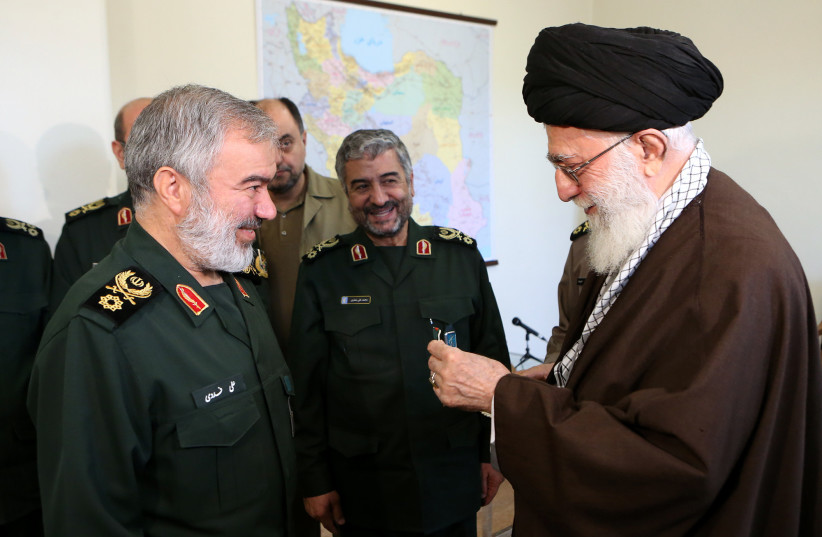The Middle East Media Research Institute (MEMRI) published a report on Thursday about the Kurdish General Hussein Yazdanpana, leader of the Kurdistan Freedom Party ( PAK), who called for the toppling of the Islamic Republic of Iran.
The report authored by the Kurdish-Swedish journalist Suzan Quitaz presents extensive photographic evidence of the Iranian Islamic Revolutionary Guard Corps (IRGC) airstrikes against PAK bases in the autonomous region of Kurdistan in Iraq. The IRGC launched airstrikes in September 2022, following the nascent revolt against the clerical regime due to its alleged murder of young Iranian-Kurdish woman Mahsa [Jina] Amini in mid-September.
The Iranian’s regime infamous morality police arrested and tortured Amini to death because she failed to properly cover her hair with a hijab. The Kurdish slogan “Woman, Life, Freedom” became a nationwide call for the abolition of the theocratic state in Iran.
The IRGC’s Deputy Commander for Operations, Abbas Nilforoushan said the IRGC "smashed the center of sedition in the Kurdistan region with point-blank missiles."
The Trump administration designated the IRGC a foreign terrorist organization. Britain's government is considering a terror prescription for the IRGC. In January, the EU parliament recommended that the European Union classify the IRGC as a terrorist entity.

According to the MEMRI report in October, “referring to Kurdish militant groups,” the IRGC tweeted: "The armored and special forces units of the Islamic Republic of Iran's armed forces are ready to be deployed to free this region of these evils forever, in case of inability of some neighbors [i.e., Iraq] in expelling elements of separatist terrorists and hypocrites stationed in the border areas."
The IRGC attacks killed 13 people and wounded 58 near Erbil and Sulaimaniya, according to news reports.
Quitaz wrote in her report for MEMRI that “The recent uprising against the Islamic republic is the result of the regime's oppression and crime against the people over the years. The PAK has been engaged in the struggle against the Iranian regime for decades. However, the movement has not made any armed contribution to the ongoing revolt.”
Following the establishment of a no-fly zone over the Iraqi Kurdish region from 1991, Yazdanpana relocated to Basur, Kurdistan, where he has been residing since the 1990s.
Kurdish independence
Quitaz wrote that “Yazdanpana supports regime change in the country and the demands for the self-determination of Kurds, Balochs, Azeri, and Ahwazis, which have been subjugated and oppressed through a brutal assimilation policy. He believes that the dissolution of the Iranian state into ethno-states will democratize the region, slow down terrorism and militarism, strengthen the economy and trade, and bring regional peace.”
In September 2017, people living in northern Iraq voted overwhelmingly for the independence of the Kurdistan Region. According to the electoral commission, 92% of the 3.3 million Kurds and non-Kurds supported independence.
Prime Minister Benjamin Netanyahu endorsed Kurdish independence in 2017, stating that “(Israel) supports the legitimate efforts of the Kurdish people to achieve their own state” He added the people of Israel have a “deep, natural sympathy…for the Kurdish people and their aspirations.”
According to Yazdanpana, "After all those attempts to disconnect us, we are still one people. We suffered under repressive governments, but they could not turn us into Iraqis, Iranians, Syrians and Turks. There will be a day, either in my lifetime or beyond, that the borders between the different parts of Kurdistan will be erased."
The MEMRI article said that “The PAK is a national liberation freedom party fighting to achieve national sovereignty. Its aim is to establish a Greater Kurdistan unifying more than four million Kurds, who are scattered in four occupied parts of Kurdistan across Iran, Iraq, Syria, and Turkey.”
The report continued that “ The PAK is a secular center-left movement, and its program is based on gender equality, the democratic rule of law, peace, and co-existence with all ethnic and religious minorities living in the Kurdish region. PAK believes in a parliamentary system and the people's right to choose their own representatives.”